Research and development in Alsace
Strongly supported by the Grand Est Region, public and private research supports innovation among Alsatian companies.
Alsace has a strong public research hub based on the excellence of its laboratories, universities, and hospital infrastructures. In addition, a significant number of private laboratories and companies active in private research complement the R&D offering in the region.
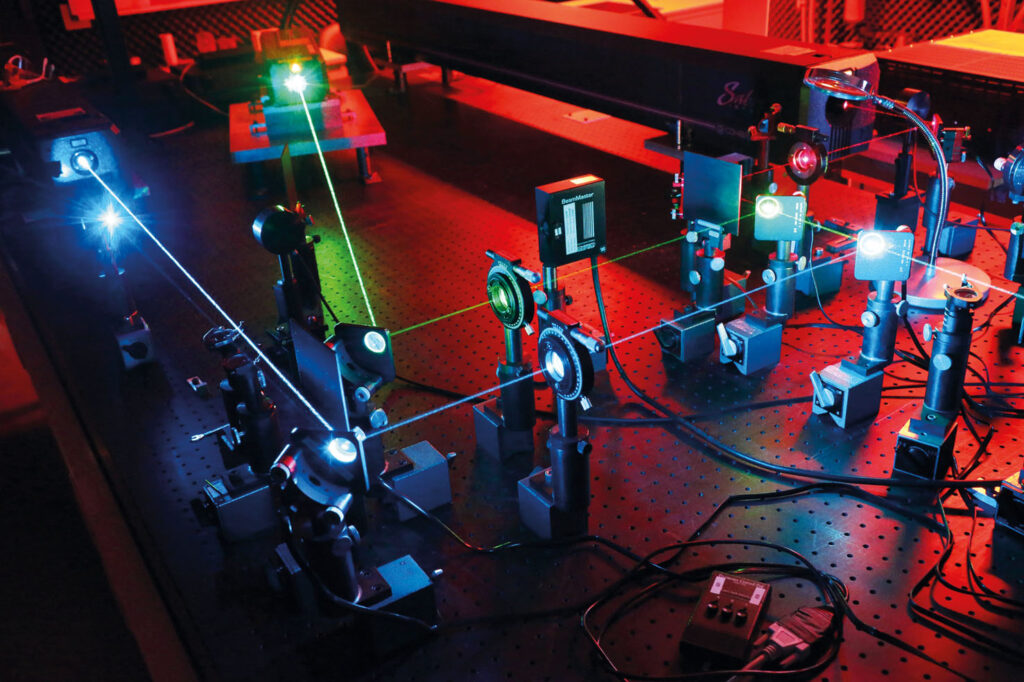
Alsace also has two renowned universities, with more than 80,000 students each year. These universities offer over 1,000 programs in various specialties and award more than 300 different degrees, whether through initial training, continuing education, or work-study programs.
The training offer covers all major disciplinary sectors of higher education, ensuring intellectual renewal in the Alsatian labor market.
Public research in Alsace
5
currently active Nobel Prize winners
50
European research projects
3
competitiveness clusters
University of Strasbourg
The University of Strasbourg is a leading institution for scientific research, with 3,500 researchers and teacher-researchers spread across nearly 80 research units, 60% of which work in partnership with CNRS, Inserm, or Inra.
80
research units
63
scientific research platforms
3400
teacher-researchers
Research in science and technology includes 19 research units. Here are some examples:
- Complex Matter Chemistry (CMC)
- School and Observatory of Earth Sciences (EOST)
- Carnot MICA Institute
- Charles Sadron Institute (ICS)
- Institute of Supramolecular Science and Engineering (ISIS)
- Laboratory of Engineering, Computer Science and Imaging Sciences (ICube)…
Explore all the Science and Technology research units at the University of Strasbourg : Science and technology – University of Strasbourg
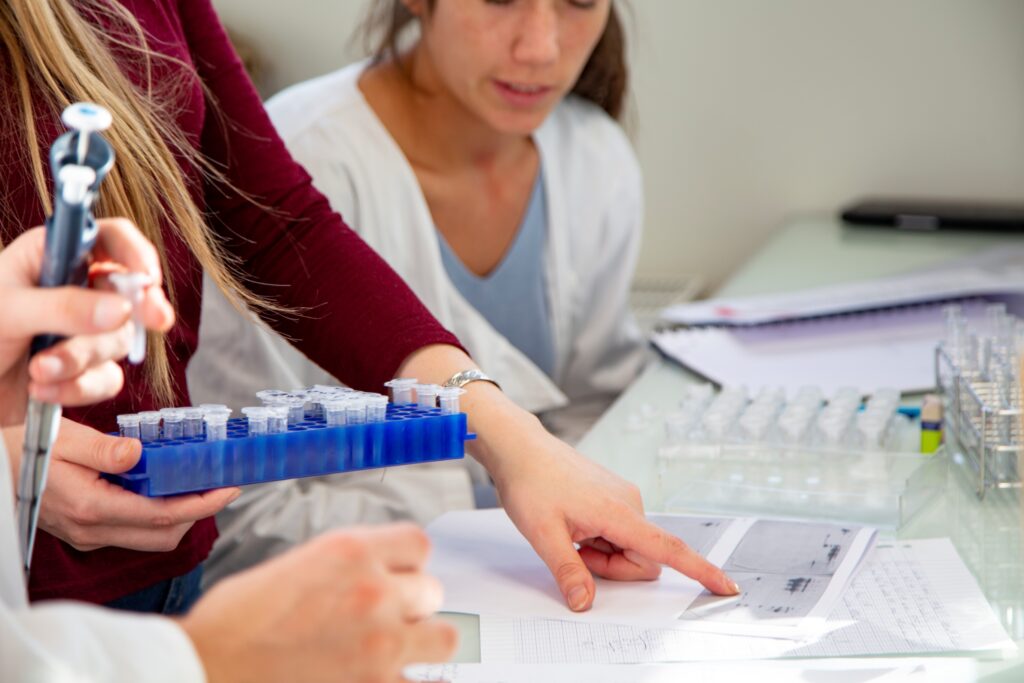
The chemistry cluster at Unistra
The chemistry research cluster at the University of Strasbourg operates at the crossroads of biology, physics, medicine, and materials science. It is home to the only Advanced Thematic Research Network (RTRA) in France dedicated to chemistry. Comprising 80 research teams and a total of 1,000 researchers and faculty members, its research is structured around three main areas: Future Materials, Sustainable Development, and Health.
- 1st university in the European Union in chemistry (Shanghai ranking 2025)
- 1st university in the EU for innovation impact, 16th worldwide ahead of Harvard, CalTech, Yale, Cambridge, and Oxford (Nature Index Innovation 2017).
Strasbourg University Hospitals (HUS)
Research and innovation are central priorities for HUS. Their activities include:
- Clinical research, meaning research applied to humans, covering therapeutics, pharmacology, physiology, and genetics
- Development and dissemination of innovative biotechnologies that best address national demographic and epidemiological challenges
Research Institute Against Digestive Cancer (IRCAD)
IRCAD (Institut de Recherche contre les Cancers de l’Appareil Digestif) is a world-renowned center affiliated with Strasbourg University Hospitals, specializing in research and training in minimally invasive and robotic surgery. It brings together international experts, engineers, and surgeons around cutting-edge technologies to advance computer-assisted surgery.
Beyond its specific focus on digestive cancers, IRCAD plays a key role in medical innovation and the dissemination of best surgical practices worldwide through a multidisciplinary approach and a global network of affiliated centers.
Main research themes at IRCAD are E-Health, Ultrasound, Artificial Intelligence, Education, Augmented Reality, Robotics, and Optical Imaging
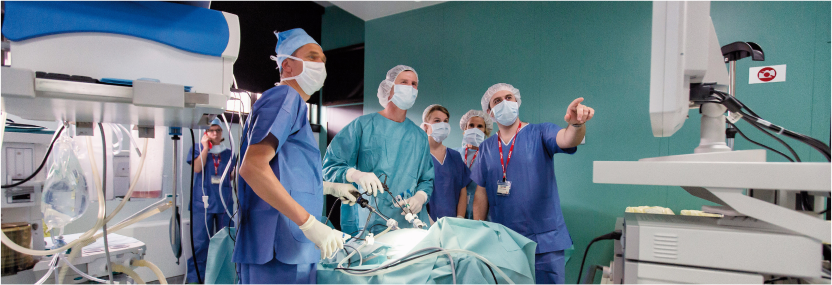
University of Haute-Alsace
The University of Haute-Alsace stands out for its highly active collaborative research with local, national, and international economic players. Its 16 laboratories are grouped into three research areas:
- Chemistry, functional materials & environment
- Interculturalities: Humanities, societies, sustainable economies
- Intelligent systems, digital technologies, advanced processes and textiles
Discover all research laboratories at the University of Haute-Alsace : Laboratories – UHA
Research at UHA is interdisciplinary and has led to numerous breakthrough innovations (materials, autonomous vehicles, smart buildings…). It has helped promote niche scientific themes such as energy storage, the industry of the future, viticulture, textiles, school dropout prevention, interculturality, and autonomy.
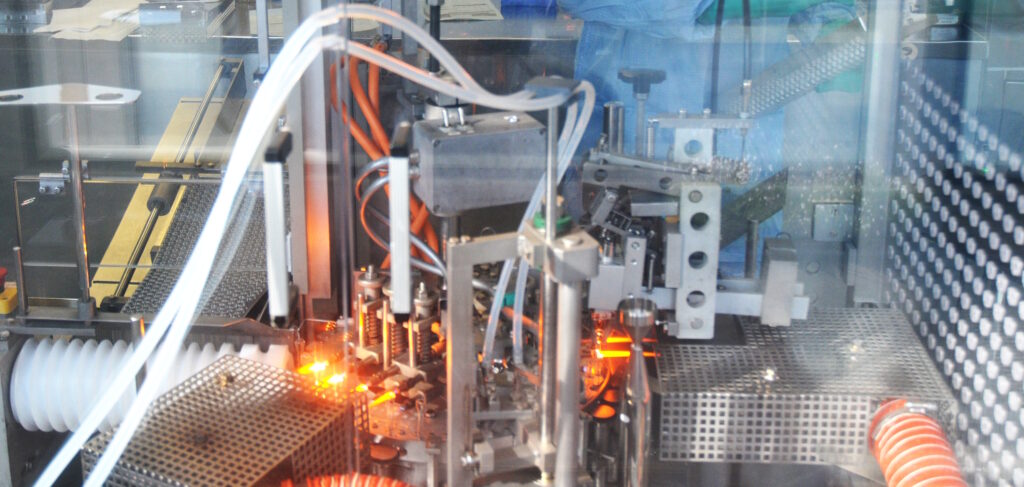
CNRS
A major player in fundamental research on a global scale, CNRS is the only French organization active in all scientific fields.
In Alsace, all scientific disciplines are covered by CNRS research in cooperation with higher education institutions, national and international research organizations, and partner companies.
4
sites (Strasbourg and Mulhouse)
41
laboratories
816
researchers and PhD students
919
engineers and technicians
63
nationalities
79
companies created from CNRS since 1999
(Source : Rapport d’activité CNRS Alsace 2023-2024)
The CNRS is affiliated with the main higher education and research institutions in Alsace: University of Strasbourg, University of Haute-Alsace, Inserm, INSA, and the Franco-German Research Institute of Saint-Louis…
European Center for Quantum Sciences (CESQ)
The UpQuantVal project is a tri-national consortium (France, Germany, and Switzerland) composed of 16 academic and industrial partners as well as research organizations. It includes, for example, the universities of Strasbourg and Freiburg (Germany), CNRS, the National Institute of Applied Sciences (INSA) in Strasbourg, and the Karlsruhe Institute of Technology.
It brings together the entire value chain, from fundamental research and educational infrastructure to applied research and industrial applications. Its goal is to take quantum sciences out of academic laboratories and encourage companies that could be impacted by quantum sciences to participate in their development.
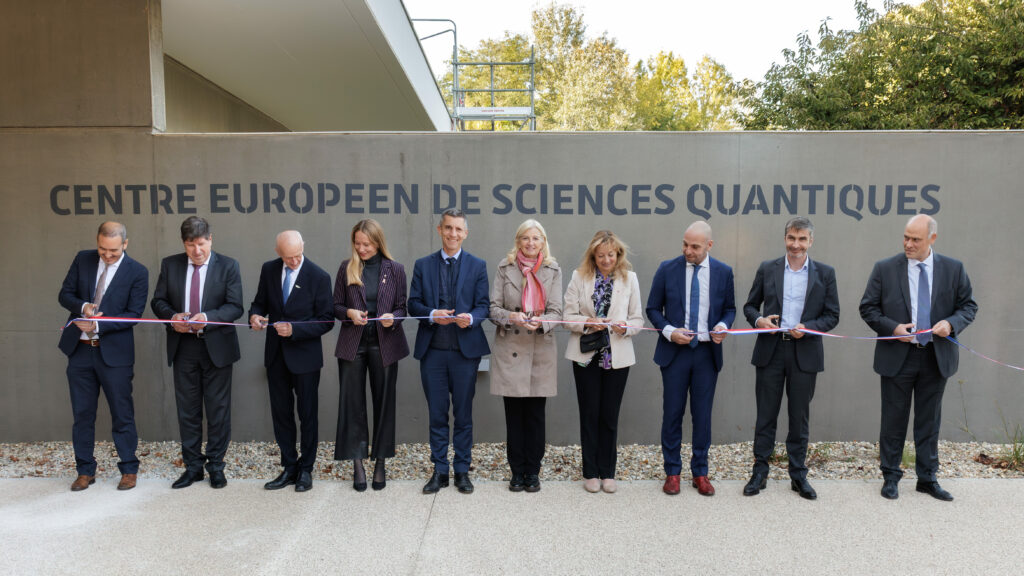
INSERM – National Institute of Health and Medical Research
INSERM is the only French public organization entirely dedicated to health. Its mission is to advance knowledge about life and diseases and develop innovations to improve everyone’s health. It operates across the entire sector, from research laboratories to patient care.
INSERM regional delegation in Strasbourg
INSERM Strasbourg covers Eastern France and supports 11 local research structures such as the Strasbourg Biomedical Research Center (CRBS) and the Institute of Genetics and Molecular and Cellular Biology (IGBMC).
About 100 researchers work on topics such as cancer, viral and liver diseases, genetics, neurodegenerative diseases, addictions, and regenerative medicine.
INSERM research teams in Strasbourg maintain numerous scientific collaborations with European teams and laboratories, such as in Ulm, Germany. The regional INSERM East delegation works in synergy with all Alsatian partners involved in research, including universities, university hospitals, the French Blood Establishment, and other national research organizations.
More information: INSERM East Delegation
INRAE (National Research Institute for Agriculture, Food and Environment)
INRAE aims to provide solutions for life, people, and the planet by offering new directions through research, innovation, and public policy support to foster sustainable agricultural and food systems. INRAE helps address challenges such as:
- Climate change mitigation and adaptation
- Food and nutritional security
- Agricultural transition
- Preservation of natural resources
- Biodiversity restoration
- Risk anticipation and management
The INRAE Grand Est Colmar center is organized around two research units:
- Vine health and Wine quality: develops sustainable protection strategies against vine diseases for sustainable, high-quality, and environmentally friendly viticulture
- Environment and Agronomy Laboratory: develops methods to assess the impact of agricultural practices on biodiversity and its services using a multi-criteria approach
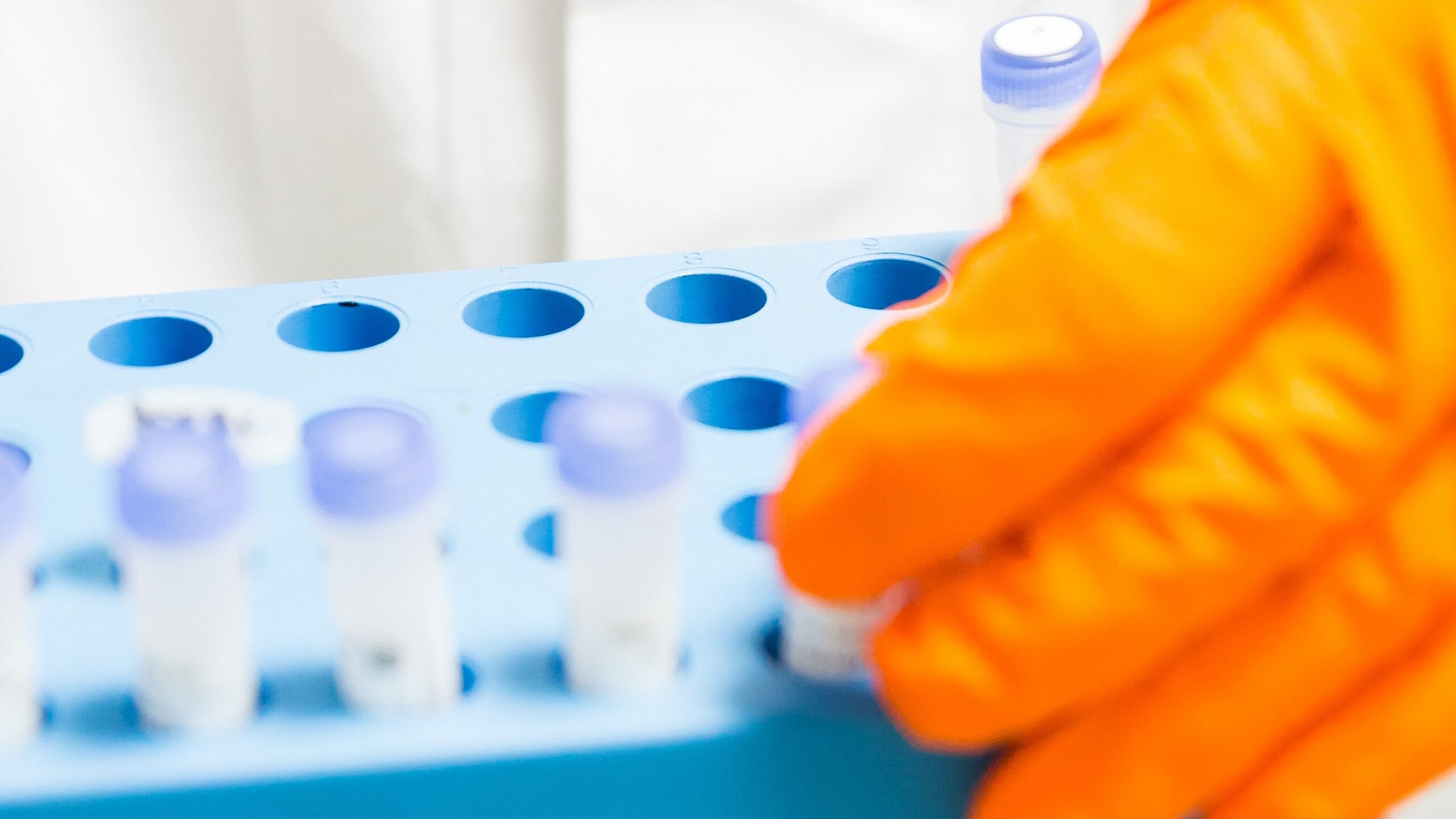
Carnot MICA Institute
Carnot MICA Institute’s mission is to support companies throughout their research, development, and transformation projects.
By assisting companies from fundamental research to practical application, MICA offers a complete and unique range of services to enhance the competitiveness of the economic and industrial fabric:
- Materials, surfaces, and interfaces and associated processes
- Multi-scale characterization
- Performance testing
- Pilot production
MICA enables companies to:
- Optimize production processes
- Increase profitability
- Develop R&D
- Provide advice and guidance on innovation funding
- Transfer technologies
Technology transfer
SATT CONECTUS
SATT Conectus brings together Alsatian public research laboratories and companies to foster collaborations between these two worlds and boost French innovation.
As the first SATT (Technology Transfer Acceleration Company) created in France in 2012, Conectus takes researchers’ inventions to market and promotes all forms of collaboration between researchers and companies.
Since 2012 :
- 161 scientific projects supported up to pre-industrial scale
- 216 breakthrough innovations transferred to the socio-economic world
- 3,615 contracts signed between public laboratories and private partners
KTUR²
Led by EUCOR, the Knowledge Transfer Upper Rhine 2 (KTUR²) project offers companies privileged access to innovation and cutting-edge technologies by focusing on several strategic areas in the Upper Rhine region.
In this cross-border region, 12 universities from three different countries mobilize their research units to build a bridge between academia and business to stimulate innovation in the region.
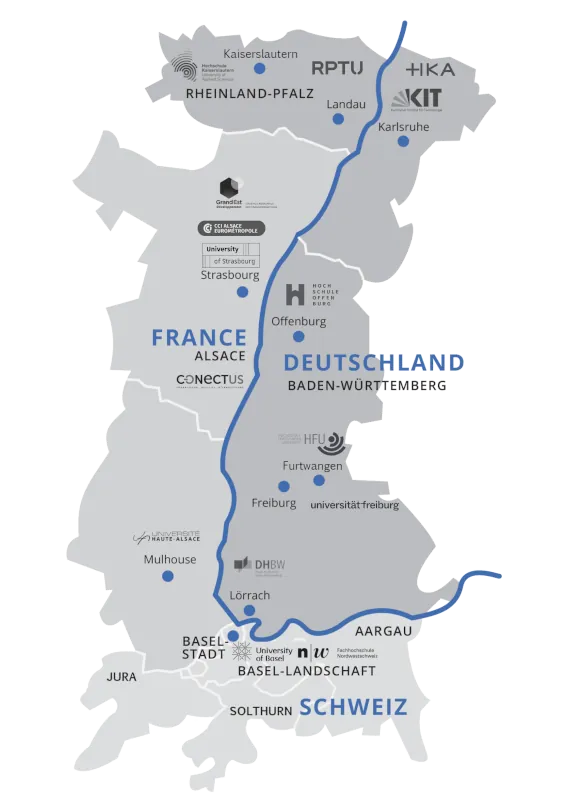
Regional Innovation and Technology Transfer Centers (CRITT)
- CRITT Matériaux Innovation (CRITT Matériaux Innovation: expertise and R&D in materials): Analysis, testing, expertise, and R&D center specializing in the study and characterization of materials and their surface properties
- RITTMO – Agro-environment (https://www.rittmo.com): Private research center specializing in fertilization, bio-inputs, and agro-environment. RITTMO was created around the idea of intelligently recycling organic waste into fertilizers useful for plants and soils.
- Aérial (Aerial – CRT – The right dose of innovation): Aerial supports your research, innovation, and industrial development projects in food processing, freeze-drying, and the broad application of irradiation technologies using electron beams or X-rays.
- Holo3 (Holo3 – Optical metrology): Member of the Carnot Institute, HOLO3 Virtual Reality conducts R&D projects while developing applications in virtual and augmented reality using its own design tools. This enables it to provide services to companies while carrying out technology transfer operations.
Technological platforms
For private players, connections are facilitated by SATT Conectus. Don’t hesitate to reach out to them for more information!
Innovation clusters
Recognized and certified by the French State, these three Alsatian innovation clusters are key drivers in making the economy more competitive. Their role is to bridge public research and businesses to foster innovation and create jobs.
Explore all 3 alsatian innovation clusters on the dedicated page: